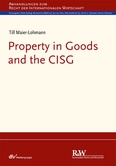I. Status quo and general opinion under the CISG
282
The starting point is that a sales contract is a contract for the allocation of the goods to the buyer against payment. Although the CISG contains no explicit rules on when the goods are sufficiently allocated to the buyer, it is commonly stated that one could derive from its Articles 30 and 53 that a contract is only a sales contract under the CISG if it requires the seller to transfer property in and possession of the goods and requires the buyer in turn to pay the price and take delivery of the goods.561 The underlying rea
283
Under national sales laws, the relevance of property to characterize sales contracts is equally discussed and oftentimes affirmed.564 However, such national debates do not have international contracts in mind, which adds the problem of diverging understandings of what property is and what things or objects can be subject to property rights. The discussions revolving around unharmonized national law cannot be taken at face value, and could not even be transplanted to the Convention if Article 7(1) of the CISG were not to exist.565
| 561 | Supreme Court of Lithuania, 9 March 2012, CISG-online 5111; MüKoHGB/Mankowski, Art. 1 para. 11; Torsello, pp. 191, 196; Gillette/Walt, p. 43; Ferrari, 15 Journal of Law and Commerce (1995), 159, 163; Schlechtriem/Schwenzer/Schroeter/Ferrari, 8th German edn, Art. 1 para. 13; Brunner/Gottlieb/Brunner/Meier/Stacher, Art. 2 para. 7; cf. German Supreme Court, 28 May 2014, CISG-online 2513 para. 13; Schwimann/Kodek/Posch/Terlitza, Art. 1 CISG para. 6; Achilles, Art. 1 para. 2; Karollus, p. 20; Piltz, Internationales Kaufrecht, para. 2-20; Neumayer/Ming, Art. 1 para. 1; Enderlein/Maskow/Strohbach/Maskow, Art. 1 para. 1; Soergel/Lüderitz/Fenge, 13th edn, Art. 1 para. 22; Mankowski/Mankowski, Art. 1 CISG para. 2; Kröll/Mistelis/Perales Viscasillas/Mistelis, Art. 1 para. 25; Diedrich, pp. 169; Nicolai, pp. 259, 263–264; Höß, p. 48; T. Fox, p. 21; DiMatteo/Janssen/Magnus/Schulze/Eiselen, Ch. 5 para. 27; Heuzé, para. 318 (“le transfert de propriété constitue, en effet, la caractéristique essentielle du contrat de vente, celle qui permet de le distinguer d’autres accords”); Cl. Witz, para. 112.21; Scheuch, 118 ZVglRWiss (2019), 375, 391, who, however, favors an analogous application of the CISG to contracts that do not envision a transfer of property; Muñoz, 24 Uniform Law Review (2019), 281, 287, who, however, appears not to rely on national property law to assess whether property has been transferred. Differently, P. Huber/Mullis/P. Huber, p. 43, who refers to Arts. 31, 53 but merely mentions the delivery of the goods as being necessary on the side of the seller’s obligations to characterize a contract as a sales contract and Schroeter, Internationales UN-Kaufrecht, paras. 88, 121 who does not rely on a transfer of property to characterize a sales contract. |
| 562 | Sono, FS Kritzer, pp. 512, 526; Brunner/Gottlieb/Tebel, Art. 41 para. 21. |
| 563 | Torsello, pp. 191, 199. Less convinced, however, in Torsello, 38 Journal of Law and Commerce (2019–2020), 273, 286, where he does not emphasize the obligation to transfer the property, and goes on to argue that contracts other than sales contracts can be subject to the CISG. |
| 564 | For example, Kahn, International Business Law Journal (2001), 241; Niggemann, IWRZ 2023, 99, 102; BK/Giger, Art. 184 OR para. 78: “denn selbstverständlich kommt Besitz ohne Eigentum niemals kaufvertragliche Qualität zu. Erst die zusätzliche Pflicht, Eigentum zu verschaffen, löst den typisierenden Effekt aus, der beim Kauf Umsatz ist.” For Canadian sales law, see Fridman, pp. 12–13. |
| 565 | Cf. Perales Viscasillas, 28 Uniform Law Review (2023), 293, 314; contra, Magnus, Borderline Problems, pp. 1171, 1176 claiming that the definition of a sale under the CISG corresponds to the definition under national law. |


